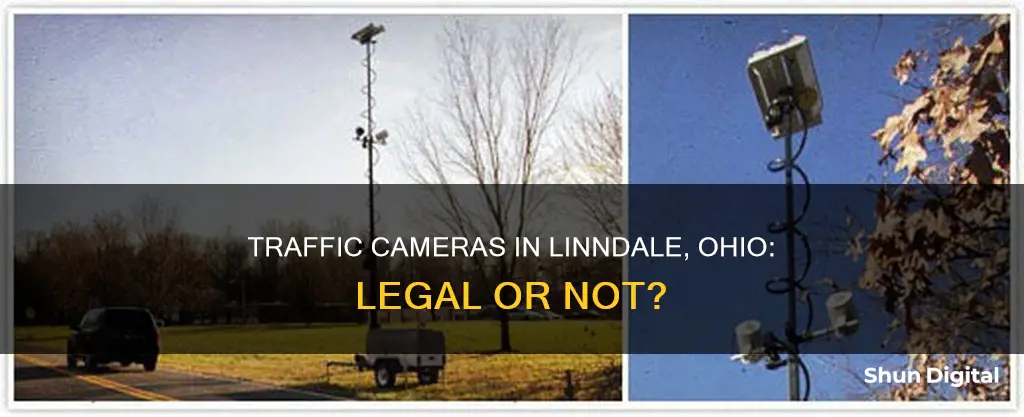
Traffic cameras in Linndale, Ohio, have been the subject of much debate in recent years, with many people questioning their legality. The village of Linndale, which has a population of just 160 people, has collected millions of dollars in speeding tickets from drivers passing through a 25 mph zone. While some argue that these cameras are a necessary tool for law enforcement and traffic safety, others view them as a cash grab by the local government. In this paragraph, we will explore the legal status of traffic cameras in Linndale, Ohio, and discuss the impact they have had on the community.
What You'll Learn

Are traffic cameras legal in Ohio?
In Ohio, traffic law photo-monitoring devices, or traffic cameras, can be used by local authorities to detect and enforce traffic law violations. This is permitted under Section 4511.093 of the Ohio Revised Code, which outlines the conditions for their use.
The use of traffic cameras is not mandated by state law, but it is allowed, and individual cities can choose to implement them according to their own guidelines and procedures. As of 2021, over 20 cities in Ohio rely on camera tickets to enforce traffic rules.
The legality of traffic cameras in Ohio has been challenged in court, with critics arguing that they violate equal protection and due process clauses and contradict city traffic codes. Despite this, the Ohio Supreme Court upheld a 2019 state law that allows the state to financially penalize cities that use automated cameras to issue tickets for speeding and red-light violations.
In certain cities, such as Linndale, traffic cameras have generated significant revenue from civil fines, leading to criticism that these cities are taking advantage of people and prioritizing financial gain over safety.
To address concerns about the legality and fairness of traffic camera tickets, drivers in Ohio have several options, including paying the fine, disputing the ticket in court, or consulting with a traffic ticket attorney to explore their legal options.
Overall, while traffic cameras are legal in Ohio, their use is subject to specific conditions and has been a topic of ongoing debate and legal challenges.
Understanding Camera Modes: Capturing Scenery with Landscape Mode
You may want to see also

What are the conditions for using traffic cameras in Ohio?
The use of traffic cameras in Ohio is subject to several conditions and regulations. While the state allows the use of traffic cameras, the decision to implement them is left to individual cities and municipalities, which can set their own guidelines and procedures. Here are the key conditions for using traffic cameras in Ohio:
Presence of a Law Enforcement Officer
According to Section 4511.093 of the Ohio Revised Code, a local authority can use a traffic law photo-monitoring device to detect and enforce traffic law violations only if a law enforcement officer is present at the location of the device during its operation. This condition ensures that immediate action can be taken in case of a violation and provides an opportunity for drivers to interact directly with an officer.
Compliance with Local Resolutions
In the case of counties or townships, the implementation of traffic cameras must comply with local resolutions. The board of county commissioners or the board of township trustees may adopt the necessary resolutions to enable the use of traffic law photo-monitoring devices by the local authorities. This provision ensures that the use of traffic cameras aligns with the specific needs and regulations of each county or township.
Adherence to Specific Sections of the Ohio Revised Code
The use of traffic cameras in Ohio is governed by specific sections of the Ohio Revised Code. Local authorities must comply with sections 4511.094 and 4511.095 when utilizing traffic law photo-monitoring devices. These sections outline the procedures for issuing tickets, the roles of law enforcement officers, and the rights of citizens in relation to traffic camera enforcement.
Prohibition on Interstate Highways
Traffic law photo-monitoring devices cannot be used to enforce or detect traffic violations on interstate highways. This restriction is specifically mentioned in the Ohio Revised Code, ensuring that traffic cameras are limited to specific areas where local authorities have jurisdiction.
Timely Issuance of Tickets
Legislation has been proposed in Ohio to require that tickets from traffic cameras be sent out within 72 hours of the violation. This condition aims to ensure that drivers receive prompt notification of their infractions and can take appropriate action to address them.
Licensing and Calibration Requirements
A bill introduced by Rep. Tom Patton (R-Strongsville) proposes requiring each traffic camera to be licensed and calibrated annually. This proposal includes a $100,000 license fee and a $5,000 monthly calibration charge per camera, with the funds being used to support a PTSD program for first responders.
In summary, the use of traffic cameras in Ohio is permitted but comes with specific conditions outlined in state and local laws. These conditions aim to balance the need for traffic enforcement with the rights of citizens and the responsibilities of local authorities.
Alone Contestants' Camera Battery Charging Strategies
You may want to see also

How much revenue do traffic cameras in Linndale generate?
Linndale, Ohio, is a tiny village with a big reputation for being a speed trap. With a population of just 108, the village has been known to collect millions of dollars a year from speeding tickets, with drivers receiving fines of up to $170. In 2021, the village collected more than $1.3 million in civil fines in just seven months from speed cameras.
In 2019, the village reported receiving $1.4 million in revenue from a camera company in the form of fines, and in 2017, this amount was $1.3 million. In 2015, the village pulled in an eye-popping $884,664.84 from camera tickets, nearly $20,000 more than it made from police-issued tickets in 2012.
The revenue from these traffic cameras has allowed Linndale to fund a police force of ten officers, as well as provide Cadillac health care plans and full hospitalization for elected officials and paid employees. The village has also been able to upgrade its police fleet, hire additional staff, and fund various renovation projects.
The use of these traffic cameras in Linndale has been a controversial topic, with state legislators attempting to curb the village's ability to issue speeding tickets. In 2012, a bill was signed into law that dissolved Linndale's Mayor's Court, resulting in a significant decrease in the village's ticket income. Despite these efforts, Linndale has continued to find ways to generate revenue from speeding tickets, such as installing speed cameras and processing some traffic violations locally.
Evading Speeding Camera Tickets: Proving Someone Else Was Driving
You may want to see also

How do traffic cameras in Linndale compare to those in other cities?
The use of traffic cameras in Linndale, Ohio, has been a highly controversial topic, with many drivers receiving tickets and facing fines. Linndale is a tiny village with a population of around 100 to 179 people, yet it has a significant number of traffic cameras and a relatively large police force. The village's small size and abrupt speed limit changes have led to accusations of it being a speed trap, with drivers receiving unexpected tickets.
In comparison to other cities in Ohio, the usage of traffic cameras in Linndale differs in several ways. Firstly, the sheer number of camera tickets issued in Linndale is notable. In 2021, Linndale had 20,619 camera tickets, more than double the number in the much larger city of Parma, which had 10,026 tickets from 12 cameras. This indicates a much higher rate of ticketing in Linndale.
Secondly, the impact of the traffic cameras on the village's finances is significant. In just seven months in 2021, Linndale collected over $1.3 million in civil fines from photo enforcement, which made up a large portion of the village's budget. This reliance on traffic camera revenue is not as prevalent in other cities, and some cities have chosen to remove traffic cameras due to the high cost of operating and enforcing them.
Thirdly, the presence of traffic cameras in Linndale has led to a reduction in state funding. In 2019, a state law was passed that reduced the amount of state dollars communities using cameras could receive. As a result, Linndale's share of the state's Local Government Fund was reduced to nothing. However, the village made up for this loss through the significant revenue generated by the traffic cameras.
Finally, the usage of traffic cameras in Linndale has faced legal challenges and criticism. State Representative Tom Patton has pushed for legislation to restrict small towns from relying heavily on fines from speeding tickets and has specifically targeted Linndale in his proposals. There have also been questions about the accuracy of the cameras and the ability to correctly identify the driver of the vehicle.
In contrast, some other cities in Ohio use traffic cameras primarily for safety purposes, such as in school zones, or for investigations rather than issuing tickets. For example, Elyria is installing cameras in intersections to help with investigations and to identify vehicles involved in Amber Alerts or with outstanding warrants.
In summary, the traffic cameras in Linndale, Ohio, differ from those in other cities in the state due to the high number of tickets issued, the significant financial impact on the village, the loss of state funding, and the legal and ethical controversies surrounding their usage. While some cities use traffic cameras primarily for safety and investigative purposes, Linndale's cameras are seen by many as a revenue-generating tool, leading to widespread criticism and attempts to restrict their use.
Kodak Camera Not Charging: Troubleshooting Guide
You may want to see also

What are the implications of not paying a traffic camera ticket in Linndale?
Traffic cameras are legal in Ohio, and the state passed a law in 2004 that allowed cities to install red-light and speed cameras to issue tickets to drivers who violate traffic laws. However, the legality of traffic cameras in Ohio is not solely based on state law but also on individual city ordinances and court rulings. While Ohio law permits traffic cameras, it does not mandate their use, and each city can establish its own guidelines and procedures for the cameras.
Now, what happens if you don't pay a traffic camera ticket in Linndale, Ohio? Well, according to some sources, not much. Linndale has gained a reputation for its aggressive use of traffic cameras and the resulting influx of revenue from fines. In 2021, the village collected over $1 million in civil fines from photo enforcement. However, it was revealed that Linndale did not send any unpaid camera tickets to a collection agency in 2020. This has led some drivers to ignore their tickets, assuming there would be no consequences.
It's important to note that these camera tickets are typically considered civil violations, not criminal offenses. They don't count against your driving record, and there are questions about whether they can be enforced if the driver's identity cannot be confirmed. However, failing to pay a fine can result in a town sending your case to a collection agency, which could negatively impact your credit score. Additionally, while Linndale may not have pursued collection agencies in the past, there is no guarantee that they won't do so in the future.
Moreover, there are potential legal repercussions to ignoring a traffic camera ticket. While it may not result in a criminal charge, you could still face civil penalties. If you choose to ignore the ticket, you may receive additional notices or even a court summons, which would incur legal fees and costs.
In conclusion, while there have been reports of drivers successfully ignoring their traffic camera tickets in Linndale, it is not advisable to do so. Failing to pay a fine can have financial consequences, and there is a risk of legal repercussions. It is always best to pay the fine or, if you believe the ticket is invalid, to dispute it through the proper legal channels.
Mastering Touch Focus: How Your Camera Can See Differently
You may want to see also
Frequently asked questions
Yes, traffic cameras are legal in Linndale, Ohio. In 2004, Ohio passed a law that allowed cities to install red-light and speed cameras to issue tickets to drivers who violate traffic laws. However, the legality of traffic cameras in Ohio is based not only on state law but also on individual city ordinances and court rulings. While Ohio law permits traffic cameras, it does not mandate their use, and each city can establish its own guidelines and procedures.
According to Section 4511.093 of the Ohio Revised Code, a local authority can use a traffic law photo-monitoring device to detect and enforce traffic law violations only if a law enforcement officer is present at the location of the device during its operation. The use of these devices is also subject to compliance with other sections of the Revised Code.
Failing to pay a traffic camera ticket or appear in court can result in negative consequences. The fine associated with the ticket may increase, and your driving record may be impacted. Additionally, you may receive a court summons, leading to additional legal fees and costs.







